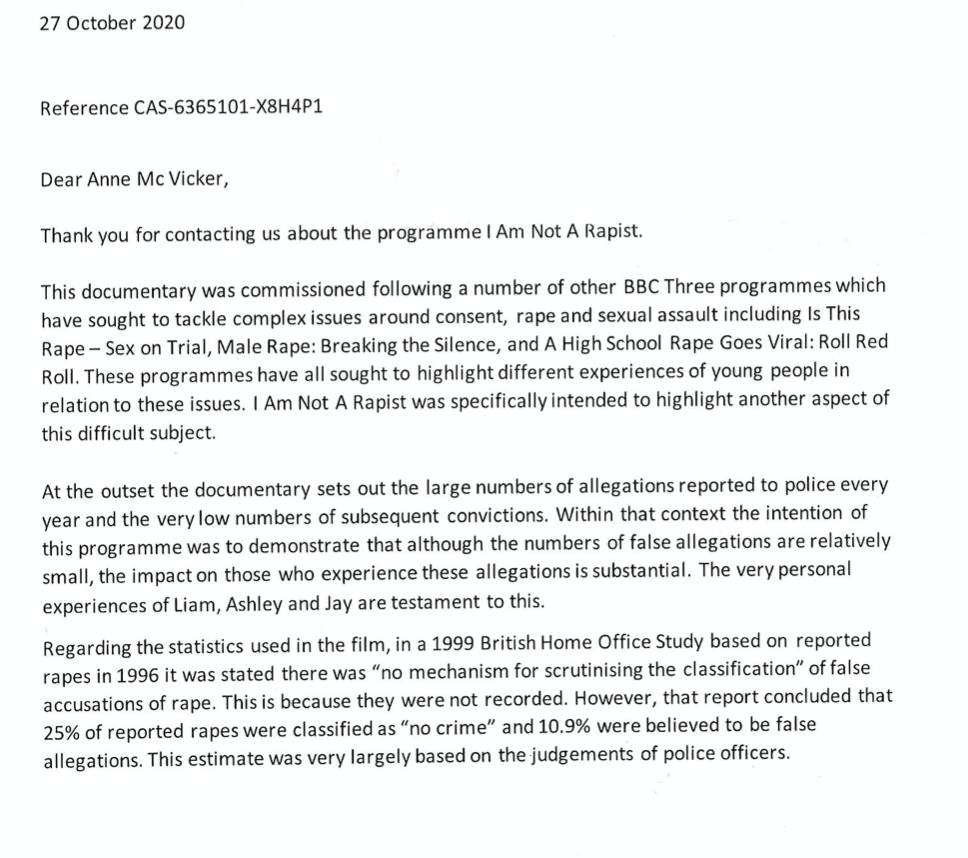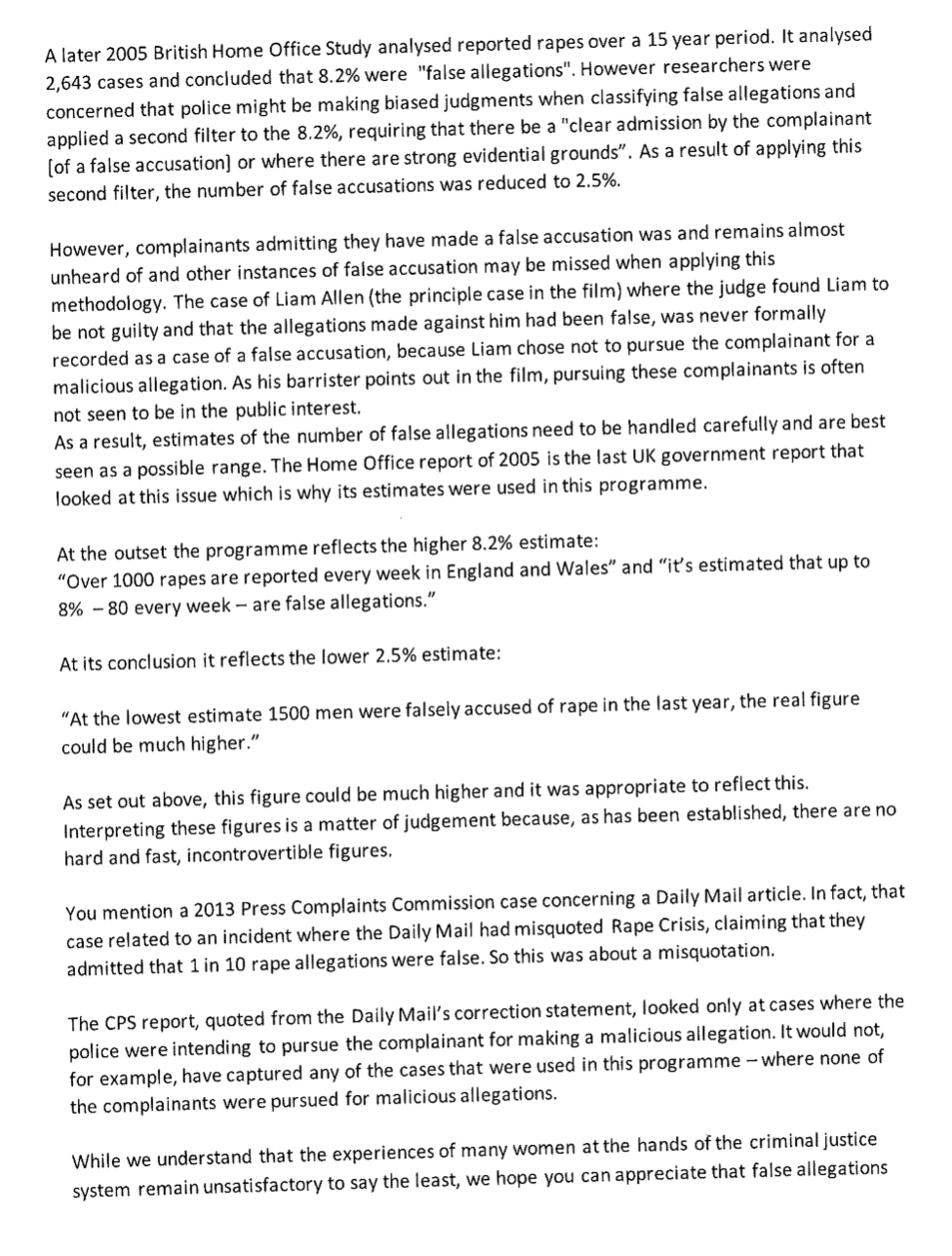A second response letter to the BBC on their problematic programming
Dear Liam Reynolds,
Thank you for your comprehensive reply to our letter concerning the BBC documentary I Am Not a Rapist. We have considered the letter in detail and we remain concerned at some of the assertions in the letter, including but not limited to the choice of sources for statistical evidence.
Our concerns were not about the choice to cover this issue in principle, rather they relate to the way that this was done - although the focus on false allegations of rape, as opposed to any other crime is telling and, in light of the already shockingly low conviction rates for rape, potentially damaging to victims who already struggle to come forward.
You mention that the substantial impact of false allegations was highlighted by the personal stories in the documentary, yet in one of the stories following a young man accused of rape, the case is framed as a “false allegation” before being dropped by the police; this may happen for a number of reasons and it does not automatically follow that there was a false allegation made. This is purported purely on the basis that the man at the centre of the case claims it is so. The issue with this framing should be obvious; if we are to treat all cases where the accused denies any charges or complaints as instances of “false allegations”, then almost all rapes, indeed all crimes, did not happen simply because the accused does not admit to the allegations. The number of prosecutions for rape is falling every year and indeed, in the year 2019-20, 98.6% of all reports of rape do not result in prosecution[1], even as reports continue to rise. There are many reasons for this, not least a reluctance to prosecute cases where it amounts to one person’s word against another; BBC documentaries that imply that allegations are false - simply because the accused denies them - can only contribute to this grave injustice.
While you choose to use a higher figure of 8.2% for false allegations on the word of police officers who, the Home Office report stipulates, may be biased in their assessments, it is inexplicable that you do so on the basis that complainants are unlikely to admit to making a false allegation.
This is a problem because:
1. Many cases of “false allegations” actually are “false reports” - in other words the person says that they were raped, but later recants. In many of these cases the complainant never accuses anyone of the crime, and therefore nobody is questioned, arrested or charged.[2] As such it is incoherent to conflate these with actual allegations against a named person. Indeed, the Home Office Study from which these figures derive refers to a study of 2,643 cases, of which 216 cases were classified by police as “false allegations”, and yet of these 216 only six cases saw arrests and only two saw charges filed[3]. To conflate these numbers with thousands of men being accused is not reflective of the reality of how most of these reports are discharged, and this again contributes to the mistaken public perception that false allegations are common and regularly destroy lives. Your programme should be mindful of contributing to this panic and at the same time undermining rape victims.
2. Your letter’s implication that the cases can be classified as “false allegations” only when a complainant admits to making such allegations, rather ignores the proviso you quoted in the letter, ie that “strong evidential grounds” can be enough to classify an allegation as false. Considering the fact that these are the same grounds needed to pursue a rape charge, this is not inconsequential.
3. Complainants may be unlikely to admit a false allegation, but equally the accused is exceptionally unlikely to admit they have committed rape. This remains an issue even after conviction; according to the Irish Prison Service, 1 in 4 convicted of sexual crimes deny their guilt while serving their sentence[4]. Quoting a 1988 study of child sex offenders by Salter, and drawing on primary research with convicted sex offenders who categorically deny their guilt, the academic paper Making Sense of Denial in Sexual Offenders says “For many, sexual deviancy does not occur when they commit the act, it occurs when they admit it. A sex offender is not a sex offender until he tells you he is. He is in some sense, a wrongly accused innocent until he says the words, “yes, I did do it.”[5] When we consider the prison sentence and the enduring stigma associated with the label “sex offender” alongside the extremely slim chances of being convicted, we can see how this would encourage the accused to deny any guilt, even if they know that they have broken the law.
On the issue of statistics, specifically your choice to select a particular, 15-year-old Home Office study relying on police officers’ classifications of allegations, it is vital to consider the fact that a further Home Office report (Home Office Research Study 293 A Gap or a Chasm: Attrition in Reported Rape Cases) on that original study clarified the breakdown of these false allegations and explained why they themselves used the metric which results in the 2.5% figure. The study itself is well worth reading in its totality, not least because of the illuminating and alarming quotes from police officers about how rarely they believe allegations and under which limited circumstances, but on this issue it includes a very telling paragraph outlining the cases where the complainant “confessed” to making a false allegation:
“Whilst not all of the cases where the complainant ‘admitted’ making a false allegation can be taken at face value, many of the accounts provided on the police pro formas had a surface credibility.
There is, however, considerably less certainty about some of the reasons underpinning police decision-making: 23 refer to mental health problems, 23 to previous allegations (some overlap occurs here); and 13 refer to alcohol and drugs. Evidence from other witnesses that supported the account of the accused was noted in nine cases (two of these involved an alibi), and the absence of CCTV evidence supporting the complainant’s account in a further nine cases. Inconsistencies in the account given by the complainant feature strongly in 30 cases, and in only 5 of these did police officers note that this involved deliberate untruths (lies as opposed to not revealing the whole truth). Previous studies have highlighted the ways in which withholding, or not remembering, information is the outcome of fearing disbelief, which may subsequently be interpreted by police officers and prosecutors as ‘lying’.”[6]
In other words, police often interpret the complainant’s circumstances as making them less credible or less honest, and despite widely available information on how rape can cause fractured memories or can cause complainants to tell their story in a non-linear way, police can interpret these behaviours as evidence of lying. The Home Office study says “Even if all those designated false by the police were accepted (a figure of approximately ten per cent), this is still much lower than the rate perceived by police officers interviewed in this study.”[7] In one police interview for the Home Office study A Gap or a Chasm: Attrition in Reported Rape Cases, an officer says: “Well, honestly, it’s because most of them are not telling the truth … I think what happens to a lot of adults is they may have consensual sex with somebody, they get found out by their husband, partner, whoever, they then say “Oh but I didn’t consent” as a way of getting themselves out of that trouble … I mean I have dealt with hundreds and hundreds of rapes in the last few years, and I can honestly probably count on both hands the ones that I believe are truly genuine.”[8] This is the stated attitude of the people that the BBC are trusting above all others to assess the truth of rape allegations, despite a justice system existing outside of the police service that is meant to deal with these cases.
In regards to your characterisation of the Press Complaints Commission ruling regarding the Daily Mail and Rape Crisis England & Wales, the ruling was partially about a misquotation, but it was also about the fact that the figures were not representative of the reality of the situation. It is unclear from your reply why the BBC is taking the assessments of police officers from 1999 and 2005 - in a report that simultaneously admits to their biases on this issue - over the more recent figures from the CPS. It is also unclear why your assessment persists in perpetuating the idea that the 2.5% figure reflects only cases the CPS intends to pursue to prosecution, when your own letter acknowledges that cases with a “strong evidential basis” are also part of that figure.
We look forward to hearing your response to this letter.
Kind regards
[1] https://www.bbc.co.uk/news/uk-53588705
[2] https://qz.com/980766/the-truth-about-false-rape-accusations/
[3] https://webarchive.nationalarchives.gov.uk/20110218141141/http://rds.homeoffice.gov.uk/rds/pdfs05/hors293.pdf p.47
[4] https://www.irishtimes.com/news/crime-and-law/sex-offenders-denying-guilt-to-be-allowed-on-treatment-programme-1.4026509
[5] Making Sense of Denial in Sexual Offenders A Qualitative Phenomenological and Repertory Grid Analysis by Blagden and Winder, Journal of Interpersonal Violence 29 (9)
https://www.researchgate.net/publication/259809250_Making_Sense_of_Denial_in_Sexual_Offenders_A_Qualitative_Phenomenological_and_Repertory_Grid_Analysis
[6] Home Office Research Study 293 A gap or a chasm? Attrition in reported rape cases https://webarchive.nationalarchives.gov.uk/20110218141141/http://rds.homeoffice.gov.uk/rds/pdfs05/hors293.pdf p.49
[7] Ibid. p.50
[8] Ibid. p.51



